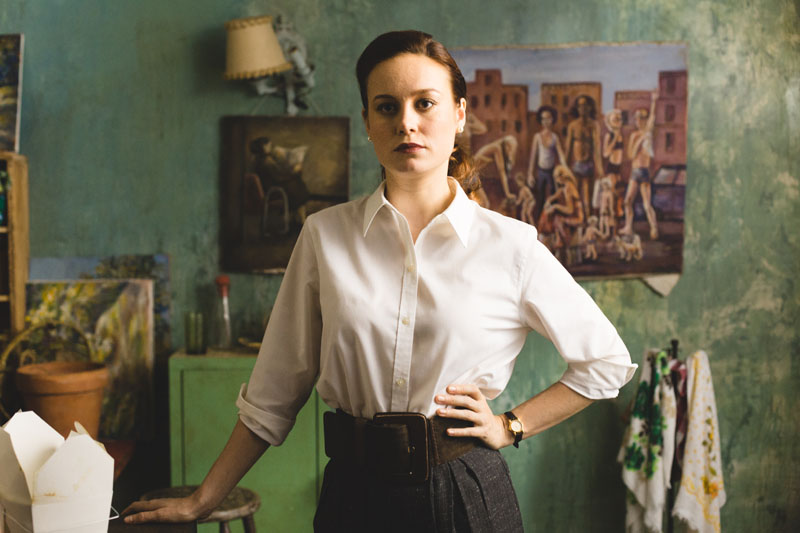
Now, I’m not saying you shouldn’t Netflix The Glass Castle (directed by Destin Daniel Cratten and written by Cratten and Andrew Lanham) on your next sick day, home from work with a mug of honey-sweetened green tea, pillows and blankets piled around you. By all means, do exactly that. Shed a tear, if you wish; it will be good for your sinuses. Just realize what you’re in for. If you’ve ever had a dad or been a girl, this movie is very intent on smashing at those particular buttons on your ’emote control.’ Not in an entirely unsatisfying way, but not masterfully, either (and isn’t that a sin of its own type?).
By cathartic measures, this film adaptation of Jeanette Wall’s memoir provides enough trigger material to prime those emotional pumps, but often without seeming to acknowledge the gravity of the situations on screen. That general toothlessness is a cap on the emotional range the cast can achieve, and it doesn’t help that Brie Larson barely gives off a flicker of emotion until almost the last scene. I understand this is the story of a self-made woman coming to terms with the poverty and abuse she endured at the hands of her drifter, huckster parents; that is to say the stoicism in Larson’s portrayal of Walls is not out of place…it simply, unfortunately, is not all that interesting to watch. It’s certainly no wonder this woman has grown up to be who and how she is, but while Larson is deadpanning her way through the role of the successful NY columnist and socialite Jeanette Walls (a hollowly-played choice she may be excused as having been directed into) – Ella Anderson as Young Jeanette is upstaging her at every turn – and with an unfaltering earnestness to boot. The material is unfairly weighted not to be in Larson’s favor and as a result, the Oscar-winner is the least interesting thing happening in what seems to have kind of been meant to be a Brie Larson vehicle. Harrelson plays large and looms large as Rex (as he’s clearly meant to) and Naomi Watts is almost criminally underutilized as Rose Mary Walls, but still charming simply by virtue of being Naomi Watts.
There are, at times, striking tonal mismatches between subject matter and the cinematic handling thereof, which tend to be jarring in the Glass Castle, and more than a few mixed messages – but what’s most strange is how the movie seems to lionize Harrelson’s character Rex, who is also by every measure the movie’s top contender for villain, if ever it were said to contain one. The attempt to paint Rex’s extreme behaviours as a complex picture of a complex man would be fine if the tone or directorial style rose to accommodate that complexity, but it doesn’t. The themes of The Glass Castle outmatch the scope its neutered tone is capable of achieving.
At the end, I asked myself “What is the cinematic value of this movie?” Its a story that can give some insight into the kind of poverty America still faces, I suppose, but that’s not its primary focus. The Glass Castle is certainly successful at executing its own melodrama, and leading the viewer to the emotional pique of the film in which Larson’s character publicly dresses down her father, subsequently cutting ties with him. She tells him “talking isn’t trying,” and I wish this was advice that someone gave the writers that adapted this screenplay. Just because you’re making these characters talk doesn’t mean you’re trying. The tone mutes the performances, and the glib adult sibling dynamic (bad chemistry? Bad scripting?) kind of serves to normalize what Wall’s fiance (played by Max Greenfield) very rightly points out as unacceptable behavior from Rex. In fact, Rex is such an asshole most of the time (and let’s be honest, he doesn’t come off as all *that* intelligent — certainly not redeemingly so), it makes it hard to see why the very reasonable, loving, stable, steady, understanding handsome fiance somehow ends up shafted and framed as a bad choice – except of course that he perhaps threaten’s Rex’s stranglehold on Jeanette’s identity. What’s more, the movie seems to celebrate Wall’s abandonment of stability in order to appease her ‘wild,’ Rex-given ‘wandering’ nature as a freelance writer, in a sad demonstration of the burden and the grip an abusive father still has on his daughter, even into adulthood.
The Glass Castle, like Woody Harrelson’s Rex, aspires ambitiously without the necessary follow through, a movie too short on delivery to entrust it with an investment of more than the cost of the box of tissues you might need on your next Netflixed-out sick day. Or maybe watch it with your mom, on-demand? She always did like ‘Woody’ from Cheers…

